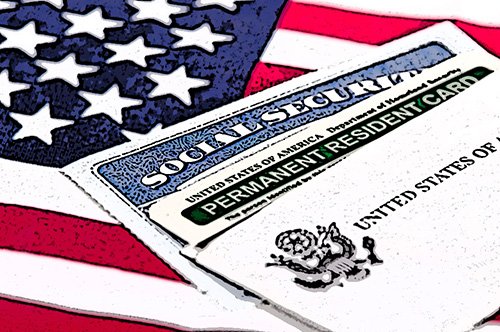Yes. Undocumented workers are entitled to receive workers’ compensation benefits in California. However, an undocumented worker may not receive temporary disability when modified work is available, or supplemental job displacement benefits when permanent work is available.
An employer that is not able to offer modified or permanent work based on an injured worker’s medical status must pay the benefits. But if the inability to offer work is due to immigration status, the benefits are not available.
The situation arises when an employer learns after an injury that the injured worker is undocumented. Under federal law, an employer cannot hire individuals who do not have a right to work in the United States.

Undocumented workers are entitled to receive workers’ compensation benefits in California.
California workers’ compensation laws are not in conflict with federal immigration laws on any other issue. Therefore, other rights and benefits are unaffected.
- Undocumented workers can receive medical treatment and permanent disability.
- An undocumented worker can settle his or her workers’ comp claim by way of Compromise and Release or Stipulated Award.
- It is illegal for an undocumented worker to file false employment documents, but it is not considered workers’ compensation fraud. Workers’ compensation fraud can result in a loss of benefits, while using false work documents will not.
In this article, our California personal injury lawyers will explain:
- 1. Can undocumented workers obtain California workers’ compensation benefits?
- 2. How does California workers’ compensation interact with federal law on immigration?
- 3. Claiming a right to work is not fraud in California workers’ compensation
- 4. Undocumented workers and specific workers’ compensation benefit
- 5. What actions can an undocumented worker take to obtain benefits?
- 6. What workers’ compensation benefits are excluded due to immigration status?
1. Can undocumented workers obtain California workers’ compensation benefits?
All injured workers are entitled to workers’ compensation benefits regardless of immigration status.1 An undocumented worker is an employee under California workers’ compensation laws.2 It does not matter if he or she is unlawfully employed due to immigration status.
Example: Vicente is hired by a factory. He has a social security number, social security card, and fills out and signs W-4 for tax withholding and I-9 for immigration status.
After working for several months, Vicente injures his back at work. He files a workers’ compensation claim. The employer learns that Vicente’s social security number is not valid and argues that it does not have pay benefits because he is undocumented.
The employer cannot avoid paying workers’ compensation benefits, even if Vicente was untruthful in filing out his employment documents.
Although an undocumented worker is still entitled to workers’ compensation benefits, the right to some benefits may be limited. Once an employer becomes aware an employee is not legally able to work in the United States, he or she cannot be hired back. The inability to return to work can affect temporary disability benefits and supplemental job displacement benefits.3
Medical treatment and permanent disability are unrelated to an injured worker’s work status and are not affected by immigration status.
An undocumented worker can still settle his or her claim by Compromise and Release or Stipulation and Award.
Even if an employer is uninsured, an undocumented worker is still entitled to benefits through a California state agency called the Uninsured Employers Benefit Trust Fund.4 The Fund will pay benefits if the employer cannot, and then seek reimbursement for its costs from the employer.
2. How does California workers’ compensation interact with federal law on immigration?
Employers must verify the work eligibility and identity of every new employee under federal law.5 However, if a potential new hire uses falsified documents, an employer may not be aware the information is invalid at the time of hiring. Once an employer becomes aware that an employee is undocumented and /or falsified his or her documents, the employer must terminate any worker that is not authorized to work in the United States.6
Under federal law, an employer can be fined and criminally prosecuted if it violates the rules on work eligibility.7 A worker who uses false documents can also be fined and criminally prosecuted.8
However, California has stated specifically that:
- Any person employed in the state can claim benefits available under state law except for reinstatement
- Immigration status is irrelevant to the issue of fault regarding a work injury and no inquiry can be made as to immigration status unless it is to comply with federal law9
The California rules protect the right of undocumented workers to obtain workers’ compensation benefits.
The California employment protections are not in conflict with United States federal immigration laws.10 Immigration laws do not specifically address workers’ compensation benefits.
The federal laws only affect workers’ compensation benefits to the extent that they do prohibit employing individuals not authorized to work in the United States.

The statements by the injured worker claiming that he or she can legally work in the United States are not relevant to the workers’ compensation case
3. Falsely claiming a right to work in the United States is not fraud in California workers’ compensation
An employer or insurer may argue that making false statements about immigration status should prevent an injured worker from receiving workers’ compensation benefits. It is based on the fact that:
- it is illegal to make false statements to obtain workers’ compensation benefits.11
- a claim by an injured worker that he or she is authorized to work in the United States is a false statement.
- an injured worker convicted of making false statements in his or her workers’ compensation case is barred from receiving benefits.12
However, an undocumented worker’s claim is for an injury at work. There is no fraud related to workers’ compensation benefits. The fraud is related to employment, not the work injury. The statements by the injured worker claiming that he or she can legally work in the United States are not relevant to the workers’ compensation case.13
4. Undocumented workers and specific workers’ compensation benefits
An undocumented worker that sustains a work injury in California should receive all workers’ compensation benefits, including temporary disability.14 Temporary disability benefits are based on medical reporting and ability to work, not on legal eligibility to work in the United States or federal law. 15
Example: Julia injures her wrist at work. Her doctor says that she cannot work due to her wrist injury.
Julia receives temporary disability benefits even though she is undocumented.
However, an injured worker that cannot work because of his or her undocumented status is not entitled to temporary disability benefits. If an employer has modified duty or light work, any injured worker that is unable to do that work due to immigration status is not entitled to temporary disability.16
Example: Mario injures his spine at work and his doctor gives him modified work that specifies he should not lift more than 20 pounds. Mario is an undocumented worker. The employer wasn’t aware of Mario’s legal status to work in the U.S. until after his work injury.
The employer has modified work that it could offer Mario. But because Mario is undocumented, it is illegal for the employer to now let him return to work.
Mario cannot work due to his immigration status, not because of a medical reason. Therefore, he is not entitled to temporary disability benefits.
To give undocumented workers temporary disability in such situations would give greater benefits to undocumented workers than employees who are working legally.17
An injured worker restricted to part-time work is only entitled to temporary partial disability for the time he or she cannot work.18
Example: Jose is a farm worker and injures his back. His doctor says Jose can only work four hours of modified work a day instead of eight.
The employer has modified work for Jose. But his employer does not take him back to work. The employer said it could not provide work because Jose is undocumented.
Jose is not entitled to temporary total disability. His immigration status is part of the reason he can’t work. He is only entitled to temporary partial disability for four hours a day based on not being medically able to work.
An injured worker would be entitled to supplemental job displacement benefits if he or she is not offered permanent employment after his or her condition is permanent and stationary.19 The supplemental job displacement benefit is a $6,000 voucher for education expenses.20
However, because an undocumented worker cannot be offered work, he or she cannot receive these benefits.21
5. What actions can an undocumented worker take to obtain benefits?
An injured worker with a dispute about immigration status related to temporary disability benefits can file a Declaration of Readiness to Proceed for a Mandatory Settlement Conference and have a trial on the issue.
The injured worker’s undocumented status will only affect a benefit related to the employer’s inability to rehire him or her.
6. Undocumented workers in the California workers’ compensation system
The California workers’ compensation system does not deny benefits to undocumented injured workers. It does not determine immigration status.22 There are no criminal or civil sanctions for the employment of undocumented immigrants.23
The system is set up to provide treatment and benefits for injured workers, regardless of fault, and to create a safe workplace.24
If denying benefits were allowed based on legal status, then unethical employers would hire undocumented immigrants and then use immigration status to deny them benefits.25
For additional help…

Contact Shouse Law Group for help.
For help with filing a worker’s compensation claim in California, completing workers comp forms or appealing a denial of benefits, contact us. Our firm helps police officers, firefighters and other workers to get compensation for their job-related injuries. For Nevada claims, visit our page on undocumented immigrants and workers’ compensation in Nevada.
Legal References:
- Salas v. Sierra Chemical Co. (2014) 59 Cal. 4th 407, 414.
- Cal. Lab. Code § 3351(a).
- Salas, at p. 424.
- Cal. Lab. Code § 3733.
- 8 U.S.C § 1324a(a)(1).
- 8 U.S.C § 1324a(a)(2).
- 8 U.S.C § 1324a(e)(4).
- 8 U.S.C § 1324a(a).
- Cal. Lab. Code § 1171.5.
- Farmer Brothers Coffee v. WCAB (2005) 133 Cal. App. 4th 533.
- Cal. Ins. Code § 1871.4(1).
- Cal. Ins. Code § 1871.5.
- Farmer Brothers Coffee, at p. 543.
- Fernando Romero v. Plantel Nurseries, Inc., 2016 Cal. Wrk. Comp. P.D. LEXIS 672, 680.
- Id.
- Martin Esparza v. Barrett Business Services, Inc. 2012 Cal. Wrk. Comp. P.D. LEXIS 21.
- Fernando Romero v. Plantel Nurseries, Inc. 2016 Cal. Wrk. Comp. P.D. LEXIS 672.
- Cal. Lab. Code § 4657.
- Cal. Lab. Code §4658.7.
- Cal. Lab. Code §4658.7(d).
- Del Taco v. WCAB (2000) 65 Cal. Comp. Cases 342.
- Farmer Brothers Coffee v. WCAB, supra.
- Id.
- Farmer Brothers Coffee v. WCAB, supra.
- Id.
